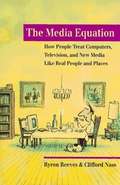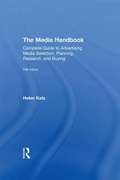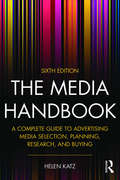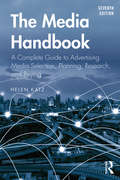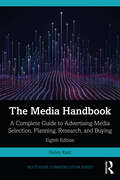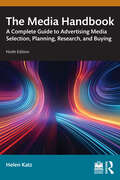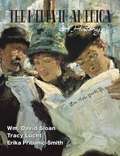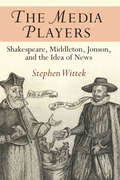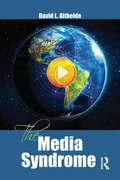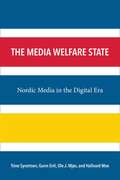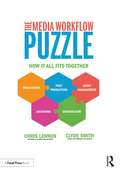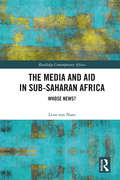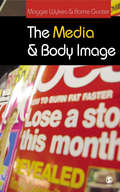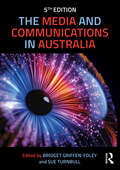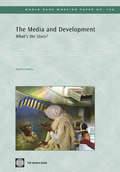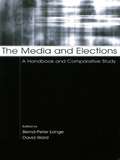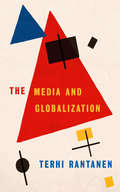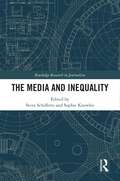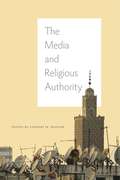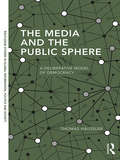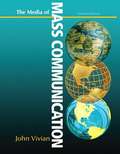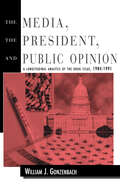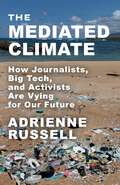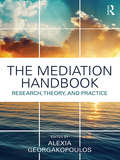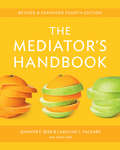- Table View
- List View
The Media Equation: How People Treat Computers, Televisions, and New Media Like Real People and Places
by Byron Reeves Clifford NassAccording to popular wisdom, humans never relate to a computer or a television program in the same way they relate to another human being. Or do they? The psychological and sociological complexities of the relationship could be greater than you think. In an extraordinary revision of received wisdom, Byron Reeves and Clifford Nass demonstrate convincingly in The Media Equation that interactions with computers, television, and new communication technologies are identical to real social relationships and to the navigation of real physical spaces. Using everyday language, the authors explain their novel ideas in a way that will engage general readers with an interest in cutting-edge research at the intersection of psychology, communication and computer technology. The result is an accessible summary of exciting ideas for modern times. As Bill Gates says, '(they) ... have shown us some amazing things'.
The Media Handbook: A Complete Guide to Advertising Media Selection, Planning, Research, and Buying
by Helen KatzThe Media Handbook provides a practical introduction to the advertising media planning and buying process. Emphasizing basic calculations along with the practical realities of offering alternatives and evaluating the plan, this fifth edition reflects the critical changes in how media is planned, bought, and sold by today's industry professionals. Author Helen Katz looks at the larger marketing, advertising, and media objectives, and follows with an exploration of major media categories, including digital media. She provides a comprehensive analysis of planning and buying, with a continued focus on how those tactical elements tie back to the strategic aims of the brand and client. Also available is a Companion Website that expands The Media Handbook's content in an online forum. Here, students and instructors can find tools to enhance course studies such as chapter overviews, PowerPoint slides, and sample questions. With its emphasis on real-world industry practice, The Media Handbook provides an essential introduction to students in advertising, media planning, communication, and marketing. It serves as an indispensable reference for anyone pursuing a career in media planning, buying, and research.
The Media Handbook: A Complete Guide to Advertising Media Selection, Planning, Research, and Buying (Lea’s Communication Series)
by Helen KatzThe Media Handbook provides a practical introduction to the advertising media planning and buying processes. Emphasizing basic calculations and the practical realities of offering alternatives and evaluating the plan, this sixth edition reflects the critical changes in how advertising in various media is planned, bought, and sold by today’s industry professionals. Author Helen Katz looks at the larger marketing, advertising, and media objectives, and follows with an exploration of major media categories, covering paid, owned, and earned media forms, including digital media. She provides a comprehensive analysis of planning and buying, with a continued focus on how those tactical elements tie back to the strategic aims of the brand and the client. Also available is a Companion Website that expands The Media Handbook’s content in an online forum. Here, students and instructors can find tools to enhance course studies such as chapter overviews, PowerPoint slides, and sample questions. With its emphasis on real-world industry practice, The Media Handbook provides an essential introduction to students in advertising, media planning, communication, and marketing. It serves as an indispensable reference for anyone pursuing a career in media planning, buying, and research.
The Media Handbook: A Complete Guide to Advertising Media Selection, Planning, Research, and Buying (Routledge Communication Series)
by Helen KatzThe Media Handbook provides a practical introduction to the advertising, media planning, and buying processes. Emphasizing basic calculations and the practical realities of offering alternatives and evaluating the plan, this seventh edition includes greater coverage of social media, buying automation, the continued digitization of media, and updated statistics on media consumption. It covers over the top television, programmatic TV, digital advertising, and the automation of buying across all media. Author Helen Katz provides a continued focus on how planning and buying tie back to the strategic aims of the brand and the client, keeping practitioners and students up to date with current industry examples and practices. The Companion Website to the book includes resources for both students and instructors. For students there are flashcards to test themselves on main concepts, a list of key media associations, a template flowchart and formulas. Instructors can find lecture slides and sample test questions to assist in their course preparation.
The Media Handbook: A Complete Guide to Advertising Media Selection, Planning, Research, and Buying (Routledge Communication Series)
by Helen KatzThe eighth edition of The Media Handbook continues to provide a practical introduction to the media planning and buying processes. Starting with the broader context in which media planning occurs, including a basic understanding of competitive spending and target audiences, the book takes readers through the fundamentals of each media channel, leading to the creation of a media plan. Throughout, concepts and calculations are clearly explained. This new edition reflects the changes in how people consume media today with: a new chapter on how audiences are defined and created reorganization of the media channel chapters to cover planning and buying together expanded coverage of digital formats in all channels added discussion of measurement completely updated data and examples. The Media Handbook, Eighth Edition is the ideal text for courses in media planning and buying in advertising/communication departments. Supplemental online resources for both students and instructors are also available. For students, there is a list of key media associations and chapter overviews. To assist in their course preparation, instructors will find lecture slides, sample test questions, and new sample media planning exercise scenarios with accompanying practice spreadsheets. These resources are available at www.routledge.com/9780367775568, under Support Material.
The Media Handbook: A Complete Guide to Advertising Media Selection, Planning, Research, and Buying (Routledge Communication Series)
by Helen KatzNow in its 9th edition, The Media Handbook introduces students to the media planning and buying process with a concise and industry-informed approach.The book takes readers through the fundamentals of each media channel, leading to the creation of a media plan. This edition features a revised and expanded chapter on digital media for both planning and buying (including programmatic), with additional material on artificial intelligence, the metaverse and augmented/virtual reality, and streaming. It also includes more charts and tables to provide additional visual appeal and understanding. Newly updated data, more international brand examples, and a summary of key media calculations round out this thoroughly updated edition.This text remains ideal for courses in media planning and buying in advertising and mass communication departments.Supplemental online resources for both students and instructors are also available. To assist in their course preparation, instructors will find lecture slides and sample test questions while students will benefit from chapter overviews and new sample media planning exercise scenarios with accompanying practice spreadsheets. Please visit www.routledge.com/9781032671369.
The Media In America: A History
by Wm. David Sloan Tracy Lucht Erika Pribanic-SmithThe Media in America: A History
The Media Players
by Stephen WittekThe Media Players: Shakespeare, Middleton, Jonson, and the Idea of News builds a case for the central, formative function of Shakespeare's theater in the news culture of early modern England. In an analysis that combines historical research with recent developments in public sphere theory, Dr. Stephen Wittek argues that the unique discursive space created by commercial theater helped to foster the conceptual framework that made news possible. Dr. Wittek's analysis focuses on the years between 1590 and 1630, an era of extraordinary advances in English news culture that begins with the first instance of serialized news in England and ends with the emergence of news as a regular, permanent fixture of the marketplace. Notably, this period of expansion in news culture coincided with a correspondingly extraordinary era of theatrical production and innovation, an era that marks the beginning of commercial theater in London, and has left us with the plays of William Shakespeare, Ben Jonson, and Thomas Middleton. Book jacket.
The Media Syndrome
by David AltheideOver the past 45 years, award-winning sociologist David L. Altheide has illuminated how media formats and media logic affect our understanding of social issues, of how political decisions are made, and of how we relate to each other. In this masterful, summative work, Altheide describes the media syndrome: how these factors shape our expectations of, and reactions to, both public and personal events. Ideal for courses on mass media and political communication, the book provides a detailed description of the media syndrome and its impact on daily life; uses historical and contemporary examples from Watergate to Edward Snowden; includes the changes in the ecology of communication from mass media to social media and its social impact.
The Media Welfare State: Nordic Media In The Digital Era
by Ole J. Mjøs Hallvard Moe Trine Syvertsen Gunn Sara EnliThe Media Welfare State: Nordic Media in the Digital Era comprehensively addresses the central dynamics of the digitalization of the media industry in the Nordic countries--Sweden, Norway, Denmark, Finland, and Iceland--and the ways media organizations there are transforming to address the new digital environment. Taking a comparative approach, the authors provide an overview of media institutions, content, use, and policy throughout the region, focusing on the impact of information and communication technology/internet and digitalization on the Nordic media sector. Illustrating the shifting media landscape the authors draw on a wide range of cases, including developments in the press, television, the public service media institutions, and telecommunication.
The Media Workflow Puzzle: How It All Fits Together
by Chris LennonThis edited collection brings together a team of top industry experts to provide a comprehensive look at the entire media workflow from start to finish. The Media Workflow Puzzle gives readers an in-depth overview of the workflow process, from production to distribution to archiving. Pulling from the expertise of twenty contributing authors and editors, the book covers topics including content production, postproduction systems, media asset management, content distribution, and archiving and preservation, offering the reader an understanding of all the various elements and processes that go into the media workflow ecosystem. It concludes with an exploration of the possibilities for the future of media workflows and the new opportunities it may bring. Professionals and students alike looking to understand how to manage media content for its entire lifecycle will find this an invaluable resource.
The Media and Aid in Sub-Saharan Africa: Whose News? (Routledge Contemporary Africa)
by Lena von NasoNews coverage on Africa is closely connected not only with how Western audiences see the continent, but also with how a wide Western audience builds its opinion on issues that carry consequences for the public's and governments' support and policy towards development aid. The Western media reinforce a picture of a continent that drowns in chaos, is dominated by conflicts, diseases, corruption and failed democratisation. Whose interests lie behind that? How does foreign news on sub-Saharan Africa emerge, which actors are relevant in its making, and on the basis of what interests do these actors shape the coverage that is then presented as 'neutral information' to a broad international audience? Closely examining the relationship between foreign correspondents of international news media and humanitarian organisations, Lena von Naso shows how the aid and media sectors cooperate in Africa in a unique way. Based on more than 70 interviews with foreign correspondents and aid workers operating across Africa, the book argues that the changing nature of foreign news and of aid is forcing them to form a deep co-dependency that is having a serious and largely unnoticed effect on Western news coverage. This comprehensive examination of a new paradigm will interest students and scholars of media and journalism, African studies, development and humanitarian studies and the aid and media communities operating across Africa.
The Media and Body Image: If Looks Could Kill
by Barrie Gunter Maggie WykesBlaming the media for reproducing and extolling unrealistic female bodies has almost become a popular truism. Even medical opinion notes that the media can influence young women to starve themselves and therefore act as a possible causal factor of disordered eating. Yet surprisingly, little work has addressed either the nature of media representations of the body, or the ways in which audiences interpret and use such images in our contemporary cultural context. The Media and Body Image addresses this lack and: - Draws together literature from sociology, gender studies and psychology - Brings together new empirical work on both media representations and audience responses - Offers a broad discussion of this topic in the context of socio-cultural change, gender politics, and self-identity.
The Media and Communications in Australia
by Sue Turnbull Bridget Griffen-FoleyAt a time when the traditional media have been reshaped by digital technologies and audiences have fragmented, people are using mediated forms of communication to manage all aspects of their daily lives as well as for news and entertainment. The Media and Communications in Australia offers a systematic introduction to this dynamic field. Fully updated and expanded, this fifth edition outlines the key media industries – from print, sound and television to film, gaming and public relations – and explains how communications technologies have changed the ways in which they now operate. It offers an overview of the key approaches to the field, including a consideration of Indigenous communication, and features a ‘hot topics’ section with contributions on issues including diversity, misinformation, algorithms, COVID-19, web series and national security. With chapters from Australia’s leading researchers and teachers in the field, The Media and Communications in Australia remains the most comprehensive and reliable introduction to media and communications from an Australian perspective. It is an ideal student text and a key resource for teachers, lecturers, media practitioners and anyone interested in understanding these influential industries.
The Media and Development: What's the Story?
by Gareth LocksleyThe media's contribution to development occurs simultaneously along five closely intermingled influences: plurality and transparency, behavioral, infrastructure and platform, economic, and trade. The media are at the cutting edge of technological change, where the digitalization of content, Next Generation Networks, falling device and distribution costs, ever-increasing abundance and new business models are overturning the pre-existing order of markets and the media, though broadcasting, particularly radio, remain crucial in developing countries. This offers new development opportunities requiring new policy initiatives, and the realization of this by the development community. In many instances the media has yet to attain its appropriate status on the list of development priorities.
The Media and Elections: A Handbook and Comparative Study (European Institute for the Media Series)
by David Ward Bernd-Peter LangeThis comparative study brings together academics and practitioners who work in the field of media and elections to provide a set of national case studies and an analysis of the legal and regulatory frameworks that are employed by nation states to ensure that the media perform according to certain standards during election periods. In setting out the legal and regulatory framework each chapter provides an account of the socio-political conditions and media environment in each of the countries and subsequently details the laws that govern the print and broadcast media during election campaign periods. The countries included are France, Germany, Italy, Russia, South Africa, the United States, and the United Kingdom. A set of reflections by a Member of the European Parliament and a set of recommendations for good practice in media and elections are also included. Thus, the book is organized to provide a practical guide so that it can be used as a handbook.
The Media and Globalization
by Terhi Rantanen`This is a necessary and very original book that really does address the lack of attention to media in previous discussions about globalization' - James Lull, San Jose State University There is practically no globalization without media and communications. Yet this relationship is so obvious it is often overlooked. Rantanen challenges conventional ways of thinking about globalization and shows it cannot be understood without studying the role of the media. This book offers: - a clear and accessible overview of globalization and the pivotal role of the media - an introduction to the concepts and theories of globalization - empirical data on the production and consumption of media - a methodology for relating individual, local experiences to the global picture Rantanen has made this complex and huge subject very accessible by using personal histories and pictures to engage the reader. It will be invaluable to students in international media, cultural studies, communications and international relations.
The Media and Inequality (Routledge Research in Journalism)
by Steve Schifferes Sophie KnowlesThis book brings together a vast range of pre-eminent experts, academics, and practitioners to interrogate the role of media in representing economic inequality. It explores and deconstructs the concept of economic inequality by examining the different dimensions of inequality and how it has evolved historically; how it has been represented and portrayed in the media; and how, in turn, those representations have informed the public’s knowledge of and attitudes towards poverty, class and welfare, and political discourse. Taking a multi-disciplinary, comparative, and historical approach, and using a variety of new and original data sets to inform the research, studies herein examine the relationship between media and inequality in UK, Western Europe, and USA. In addition to generating new knowledge and research agendas, the book generates suggestions of ways to improve news coverage on this topic and raise the level of the debate, and will improve understanding about economic inequality, as it has evolved, and as it continues to develop in academic, political and media discourses. This book will be of interest to academics and practitioners alike in the areas of journalism, media studies, economics, and the social sciences, as well as political commentators and those interested more broadly in social policy.
The Media and Religious Authority
by Stewart M. HooverAs the availability and use of media platforms continue to expand, the cultural visibility of religion is on the rise, leading to questions about religious authority: Where does it come from? How is it established? What might be changing it? The contributors to The Media and Religious Authority examine the ways in which new centers of power and influence are emerging as religions seek to “brand” themselves in the media age. Putting their in-depth, incisive studies of particular instances of media production and reception in Asia, Africa, Latin America, and North America into conversation with one another, the volume explores how evolving mediations of religion in various places affect the prospects, aspirations, and durability of religious authority across the globe.An insightful combination of theoretical groundwork and individual case studies, The Media and Religious Authority invites us to rethink the relationships among the media, religion, and culture.The contributors are Karina Kosicki Bellotti, Alexandra Boutros, Pauline Hope Cheong, Peter Horsfield, Christine Hoff Kraemer, Joonseong Lee, Alf Linderman, Bahíyyah Maroon, Montré Aza Missouri, and Emily Zeamer, with an afterword by Lynn Schofield Clark.
The Media and the Public Sphere: A Deliberative Model of Democracy (Routledge Studies in Global Information, Politics and Society)
by Thomas HäusslerAt the heart of modern democracy lies the public sphere, which is most centrally shaped by those actors that integrate it discursively: the mass media. The media draw together the different strands of political debates; they grant access to some actors and arguments while excluding others and thus decisively mould the political process. In this book, Thomas Häussler examines how the media reflect and react to the wider context in which they are embedded. More specifically, he focuses on whether their discourse demonstrates systematic differences with regard to the two main public sphere types that they co-constitute, according to deliberative theory, focussing in particular on the work of Jürgen Habermas. The Media and the Public Sphere promotes a deeper and more detailed understanding of the political process by foregrounding the complex relationships between the media and the public discourse they constitute. It examines how the media co-create relationships of power, analyses the structure of these discursive networks and illuminates the effects that different deliberative coalition types have on political debates.
The Media of Mass Communication Eleventh Edition
by John VivianUpdated in its eleventh edition, The Media of Mass Communication engages readers in the pursuit of greater media literacy and provides accessible insight into the important issues that confront students as consumers and purveyors of mass media. Through exceptional coverage of contemporary media issues and trends, including the on-going transformations in mass media, this text balances the principles and foundations of media literacy with lively examples, streamlined coverage, and a robust media package.
The Media, the President, and Public Opinion: A Longitudinal Analysis of the Drug Issue, 1984-1991 (Routledge Communication Series)
by William J. GonzenbachUsing a broadened conceptualization of agenda setting, this volume's objective is to examine the drug issue from mid-1984 to mid-1991 to determine how drug-related issues and events -- both real and fabricated -- and the primary agendas drove the issue over time. Based on this objective, four questions are posed: * How did the media structure interpretations of drug issues and events? * How did the president structure public relations interpretations and presentations of issue and event information over time? * What were the interactions of the drug-issue agendas, the president's public relations agendas, the media, and the public, while controlling the policy agenda and a real-world measure of the severity of the drug problem? * How did the relationships of these agendas differ during the Reagan and Bush presidencies? These questions were addressed with detailed content analyses of the media agenda over time, the presidential public relations agenda over time, and a multivariate ARIMA analysis of the time series agendas. No previous studies to date have addressed and modeled these agendas simultaneously with ARIMA modeling methods.
The Mediated Climate: How Journalists, Big Tech, and Activists Are Vying for Our Future
by Adrienne RussellTo what extent does journalism deserve blame for the failure to address climate change over the last thirty years? Critics point out that climate coverage has often lacked necessary urgency and hewed to traditional notions of objectivity and balance that allowed powerful interests—mainly fossil fuel companies—to manufacture doubt. Climate journalism, however, developed alongside the digital media landscape, which is characterized by rampant misinformation, political polarization, unaccountable tech companies, unchecked corporate power, and vast inequalities. Under these circumstances, journalism struggled, and bad actors flourished, muddling messages while emissions mounted and societies struggled to avert catastrophe.The Mediated Climate explores the places where the climate and information crises meet, examining how journalism, activism, corporations, and Big Tech compete to influence the public. Adrienne Russell argues that the inadequate response to climate change is intertwined with the profound challenges facing the communications environment. She demonstrates that the information crisis is driven not only by technological changes but also by concentrated power that predates the rise of digital media companies. Efforts to improve climate coverage must take into account the larger social and material contexts in which journalism operates and the broader power dynamics that shape public discourse. Drawing on interviews with journalists and activists, Russell considers the ways recent movements are battling misinformation. She offers timely recommendations to foster engagement with climate issues and calls on readers to join in efforts to reshape the media landscape to better serve the public interest.
The Mediation Handbook: Research, theory, and practice
by Alexia GeorgakopoulosThe Handbook of Mediation gathers leading experts across fields related to peace, justice, human rights, and conflict resolution to explore ways that mediation can be applied to a range of spectrums, including new age settings, relationships, organizations, institutions, communities, environmental conflicts, and intercultural and international conflicts. The text is informed by cogent theory, state-of-the-art research, and best practices to provide the reader with a well-rounded understanding of mediation practice in contemporary times. Based on four signature themes—contexts; skills and competencies; applications; and recommendations—the handbook provides theoretical, applicable, and practical insight into a variety of key approaches to mediation. Authors consider modern conflict on a local and global scale, emphasizing the importance of identifying effective strategies, foundations, and methods to shape the nature of a mediation mindfully and effectively. With a variety of interdisciplinary perspectives, the text complements the development of the reader’s competencies and understanding of mediation in order to contribute to the advancement of the mediation field. With a conversational tone that will welcome readers, this comprehensive book is essential reading for students and professionals wanting to learn a wide range of potential interventions for conflict.
The Mediator's Handbook
by Caroline C. Packard Eileen Stief Jennifer E. BeerThe popular The Mediator's Handbook presents a time-tested, adaptable model for helping people work through conflict. Extensively revised to incorporate recent practice and thinking, the accessible manual format lays out a clear structure for new and occasional mediators while offering a detailed, nuanced resource for professionals. Starting with a new chapter on assessing conflict and bringing people to the table, the first section explains the process step by step, from opening conversations and exploring the situation through the phases of finding resolution--deciding on topics, reviewing options, and testing agreements. The "Toolbox" section details the concepts and skills a mediator needs in order to: Understand the conflict Support the people Facilitate the process Guide decision-making Throughout the book, the emphasis is on what the mediator can do or say now, and on the underlying principles and core methods that can help the mediator make wise choices. Long a popular course textbook for high schools, universities, and training programs, The Mediator's Handbook is also a valued desk reference for professional mediators and a practical guide for managers, organizers, teachers, and anyone working with clients, customers, volunteers, committees, or teams. Jennifer E. Beer, PhD, mediates organizational conflicts, facilitates meetings, and offers related workshops, regularly teaching a negotiation course at Wharton (University of Pennsylvania). Caroline C. Packard, JD led Friends Conflict Resolution Programs for fifteen years and is an organizational conflict response specialist and mediator based in Philadelphia, Pennsylvania. Eileen Stief developed the mediation process presented in the Handbook, training a generation of mediators to work with community, multi-party, and environmental disputes.
